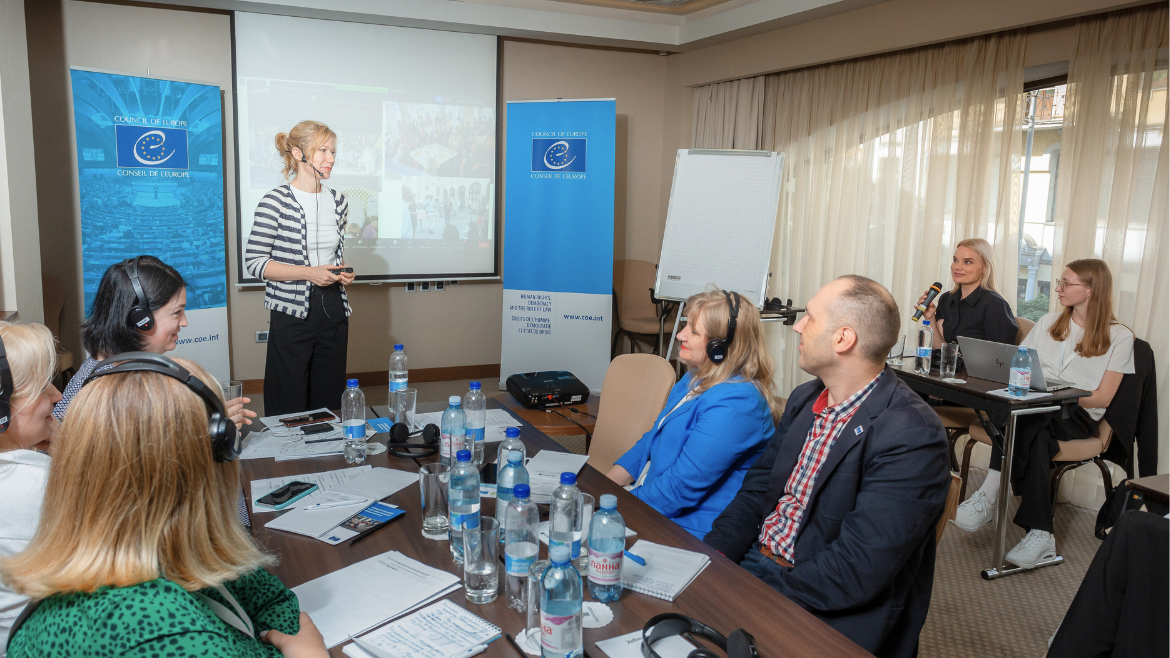The Council of Europe project “Strengthening democratic resilience through civic participation during the war and in the post-war context in Ukraine” conducted a two-day training for the coordinators of Citizens' Assemblies (CAs) on June 4-5, 2024, in Kyiv.
This training marked the beginning of the practical phase of implementing citizens' assemblies in two Ukrainian communities: Zvyahel and Slavutych, that will be provided with comprehensive expert and methodological support during the whole process.
The implementation of citizens' assemblies in Ukraine will take place for the first time, making the communities and the team of designers, organisers, coordinators, and facilitators pioneers in using this innovative tool of deliberative democracy. Moreover, Ukraine will become the first country in the world to organise citizens' assemblies during wartime.
19 people participated in the training for coordinators of citizens' assemblies, including:
- 6 coordinators of assemblies in Zvyahel and Slavutych (selected through an open call),
- representatives of the local authorities of Zvyahel and Slavutych communities,
- representatives of CSOs from various parts of Ukraine.
During the two days, the participants:
- familiarised themselves with the structure, stages of conducting a CAs, and the roles of all involved participants;
- learned to identify and apply logistical and organisational tools necessary for the successful implementation of CAs;
- acquired the necessary skills for effective coordination of the process, involved individuals, stakeholders, and members of the CA;
- learned about effective communication strategies with all stakeholders.
The training was conducted by the project's international expert, Eva Bordos, who designed and coordinated the first citizens' assemblies in Hungary and is now supporting the establishment of this process in Ukraine.
Organising a citizens' assembly is a complex process that takes several months. The assembly itself takes place over several sessions (at least two to three weekends). The development and conduct of CAs must comply with international recommendations and quality standards set by the Council of Europe.
The citizens' assemblies (sessions) in Zvyahel and Slavutych will take place in September-November 2024.
During a citizens' assembly, participants (40-150 people randomly selected) first familiarise themselves with a pre-determined topic that has importance for the community. They receive information from experts and learn important facts, viewpoints from different interest groups, and other stakeholders. Then assembly members collectively discuss the topic with the help of professional facilitators. During the discussion phase, they learn each other's views, collectively weigh facts, and consider possible solutions to the issues. At the end of the assembly, participants formulate their consensus proposals, which are then presented to the local authorities.
Citizens' assemblies are increasingly used in various countries at both local and national levels. Their success lies primarily in the fact that this tool of deliberative democracy creates a forum for discussing societal issues involving a wide range of stakeholders. For example, in Ireland, CAs addressed abortion regulations; in the United Kingdom – Brexit; and in France – climate issues following the Yellow Vests Movement. This method was also used to discuss how to change city administration in Dublin or plan Copenhagen's largest infrastructure project.
The advantages of citizens' assemblies:
- increasing the legitimacy of political decisions;
- developing potential solutions to contentious issues;
- bringing citizens closer together, enhancing understanding, solidarity, and cooperation;
- collective proposals and decisions after lengthy discussions;
- informing authorities about citizens' views and experiences and understanding where there is public consensus on a problematic issue;
- drawing broad attention to important community issues.
On March 15, 2024, the Council of Europe project “Strengthening democratic resilience through civic participation during the war and in the post-war context in Ukraine” held a conference "Visionary ways of engaging citizens: the future of deliberative democracy in Ukraine". During the event, perspectives and challenges of deliberative democracy during war and post-war period were discussed, as well as citizens' assemblies as a tool of deliberative democracy. Memorandums of understanding for the implementation of citizens' assemblies were signed between the Council of Europe Office in Ukraine and the two pilot communities of the Council of Europe project on civic participation – Zvyahel and Slavutych.
Follow project news on Facebook: https://www.facebook.com/CivilParticipationPlatform.







